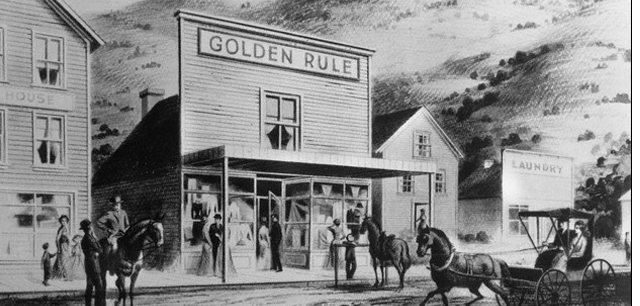J.C. Penney’s Long Forgotten Christian Roots & Our Call to Publicly Live Our Faith

According to the National Retail Federation, families with children in grades K-12 can expect to spend upwards of $800 on back-to-school shopping this summer – yet another financial blow in an increasingly expensive, inflation-charged year.
One of the oldest retailers competing for those dollars is J.C. Penney – the Plano, Texas-based company with 669 stores operating across 49 states.
But lost to the years and rapidly changing cultural conditions are the Christian roots of the legendary business, which started as a 25-foot-by-40-foot dry goods store in the mining town of Kemmerer, Wyo. The area had twenty-one saloons. It was on April 14, 1902, that James Cash Penney, along with two other partners, cut the ribbon on what would eventually become a retail juggernaut.
Born in Hamilton, MO, in 1875, James Cash Penney was the son of a Baptist preacher. Poor but enthusiastic and energetic, the youngster helped the family make ends meet by selling watermelons and feeding livestock. Seeking drier air, the family relocated to Colorado after James’ father contracted tuberculosis, which he eventually succumbed to. In the interim, though, the future retail maven would land a job in a butcher shop and then a dry goods store, learning the business and obtaining the skills he would need to start his own company one day.
Growing up, Penney’s parents had long urged him to follow the “Golden Rule” – Jesus’ teaching that, “So whatever you wish that others would do to you, do also to them, for this is the Law and the Prophets” (Matthew 7:12). So, it made sense that come 1902, Penney would name his first store after the biblical admonition.
The “Golden Rule” was a “slogan of good publicity value,” Penney acknowledged. But he also considered it “a poignant link with my father’s and my mother’s ideals and injunctions.”
Yet, his faith was still more his parents than his own.
Within five years, “The Golden Rule” store had expanded to two other locations, and annual sales had jumped from $2,800 to $166,313. By 1912, Penney was operating 34 stores with sales topping $2 million.
“The Golden Rule” chain became “The J.C. Penney Co.” in 1913, relocating its headquarters from Salt Lake City to New York, in order to be closer to the garment district. Exponential growth would continue until the Great Depression of the 1930s – a turn that drove the retailer to a near mental breakdown and almost sent Penney’s empire into bankruptcy.
Retreating to a sanitarium in Battle Creek, Mich., Penney found himself wandering the hallways one morning when he heard the sound of a familiar hymn. It was coming from a small chapel filled with doctors and nurses. Stepping inside, he then heard someone reading Jesus’ words from the Gospel of Matthew: “Come unto me all you that are heavy laden, and I will give you rest” (11:28).
“At that time something happened to me which I cannot explain,” Penney would later reveal. “It was a life-changing miracle, and I’ve been a different person ever since. I saw God in His glory and planned to be baptized and to join a church.”
He continued:
“Suddenly needing to be heard, I cried inwardly, ‘Lord, will you take care of me? I can do nothing for myself!’ . . . I felt I was passing out of darkness into light.”
Penney then heard the Lord say, “Only believe.”
“In the midst of failure to believe, I was being helped back to believing,” he reflected.
Penney’s faith, along with his fortunes, rebounded. By the 1950s, the stores were bringing in over $1 billion. In 1971, when Penney died at the age of 95, sales topped $4 billion.
As it would happen, Penney’s eventually filed for bankruptcy in the midst of the Covid pandemic in May of 2020. The store is now under new ownership, and its future remains an open question.
In our increasingly secular culture, many in corporate America grow nervous about the blending of faith and business. Just consider the heat Chick-fil-A and Hobby Lobby have taken for leading with their deeply held religious convictions. But the words of James Cash Penney should be heeded and heralded as a good reminder that believers cannot and should not separate their faith from any of their activities.
“The assumption was that business is secular, and service is religious,” he once said. “I have never been able to accept that line of arbitrary demarcation. Is not service part and parcel of business? It seems to me so; business is therefore as much religious as it is secular. If we follow the admonition to love God, and our neighbors as ourselves, it will lead us to understand that, first of all, success is a matter of the Spirit.”
ABOUT THE AUTHOR
Paul J. Batura is a writer and vice president of communications for Focus on the Family. He’s authored numerous books including “Chosen for Greatness: How Adoption Changes the World,” “Good Day! The Paul Harvey Story” and “Mentored by the King: Arnold Palmer's Success Lessons for Golf, Business, and Life.” Paul can be reached via email: Paul.Batura@fotf.org or Twitter @PaulBatura
Related Posts

The Refreshing Patriotism of Olympian Jasmine Jones
February 13, 2026

Colorado Committee Kills ‘Children Are Not for Sale Bill’
February 13, 2026

Washington School District Buries Female Wrestler’s Sexual Assault Complaint Against Male Opponent
February 12, 2026

“Who Am I?”: James Van Der Beek’s Final Answer
February 12, 2026
